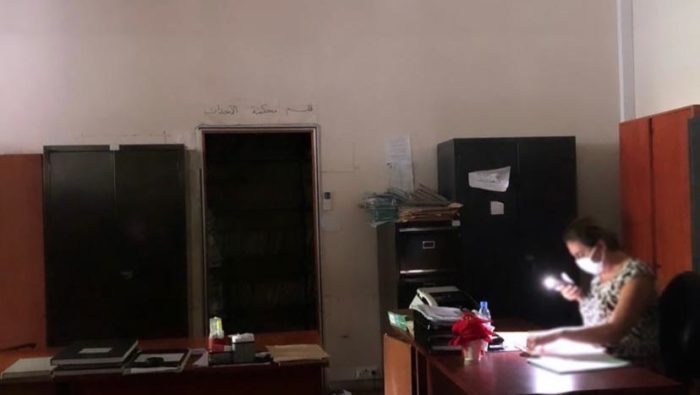
Fieldwork in Times of Crisis: Notes from Lebanon

I started my PhD programme in October 2019, committed to conducting an empirical study exploring the adjudication of children in Lebanese courts. If you had asked me back then what the biggest challenge to my research would be, it wouldn’t have crossed my mind that within the next two years my home country – and research site – would witness the largest popular protests since its independence, the world’s worst financial crises since the mid-19th century, a pandemic, and the biggest non-nuclear explosion in history. Cynically described as the Lebanese ‘apocalypse’, the crisis left an overwhelming sense of despair in the country, inevitably presenting difficult ethical and practical challenges to my fieldwork.
A few days after my arrival to Oxford, my compatriots took to the streets to protest the deteriorating economic situation in the country. Citizens woke up to discover that their life savings had transformed into monopoly money, as banks imposed illegal restrictions on cash withdrawals. The situation was intensified by the COVID-19 pandemic and the subsequent lockdown in March 2020, which also coincided with the country’s default on its foreign debt, signalling a state of bankruptcy and a free fall in the local currency. On 4 August 2020, the Beirut Port massacre rocked through the capital killing 218 people, leaving more than 7000 injured and displacing approximately 300,000 people. With the shortage in foreign currency reserve, food prices skyrocketed, essential medicines were no longer available, electricity cuts left the country in total darkness, and ordinary items became a luxury that only few can afford. My research participants, judges and clerks, had lost more than 90 per cent of the value of their salaries. Demolished by the blast, courts were also closed due to the lockdown; minimal remote hearings were organised at the sole initiative of judges using personal Zoom or WhatsApp accounts, leading to a delayed start of fieldwork. Data collection would later be regularly interrupted either due to roadblocks, security clashes, fuel and electricity shortages, or the recurrent strikes of employees and lawyers. As I was writing this piece, clashes between armed groups were taking place right in front of my research site, the Beirut courthouse.
Beyond the obvious logistical hurdles echoing global disparities in infrastructures between countries of the global south and global north, fieldwork has pushed me to reflect on my positionality as a researcher. A tweet reads, ‘All of us in Beirut were transported to a new reality, the lucky dead who survived’. The crisis and its impact on my research subjects – and myself as a Lebanese citizen living amidst it – is undeniable and often left me reluctant to approach my participants. How can I talk about ‘the ordinary’ in a courthouse devastated by the blast, to public servants witnessing the atrocious theft of their income? How does one research ‘home’ in difficult times? How can I describe life in the ‘field’, which also happens to be my everyday reality, without falling into victim playing or feeding into ‘exotic’ narratives of orientalism? How can one theorise an ongoing massacre? Reflecting on these questions has helped me acknowledge the difficulty of keeping emotional distance from my research field and topic, has pushed me to be more reflexive, and to recognise the emotional labour that a research project ‘close to home’ entails.
The abysmal situation in the country sparked a difficult quest to accept my passive role in the field as a researcher, and prompted questions as to the relevance of academic research at this time, and, to put it simply, the extent to which it can contribute to ameliorating the lives of those researched. One thing that was particularly helpful was that of not restricting myself to my researcher status at all times; being an active member of local advocacy groups was undoubtedly rewarding. As fieldwork progressed, I was compelled to play a less passive role: when lawyers went on strike for five months, juvenile hearings were paralysed because the law required the mandatory representation of a lawyer. Given my accreditation as a lawyer, judges would often appoint me to proceed with the hearing immediately. This has raised two folds of unexpected ethical considerations: as a lawyer, I was not only risking a warning from the Bar, but also compelled to provide an immediate legal defense without prior preparation. Furthermore, my independent observer status as a researcher was challenged as I became part of the system I was meant to observe. However, I believe that it was a responsible and ethical choice, first because my refusal would have resulted in prolonged detention times for juveniles, but also because my involvement did not jeoperdize my standing as a researcher as I was only observing judicial attitudes and not those of the individuals I was representing.
As Socio-Legal scholars we are often taught to follow the data, which has meant paying close attention to the context in which knowledge production is occurring. While I had initially anticipated to focus on the intersection of religious and civil law in the construction of the concept of childhood, the context of the research imposed itself on the findings with poverty being a major recurrent theme, echoing the socio-economic inequalities in the country. While I do not consider that all research ought to be action oriented nor ‘relevant’, my research has revealed the flexibility of qualitative research and its intrinsic relation to the relevant issues and voices on the ‘ground’.

